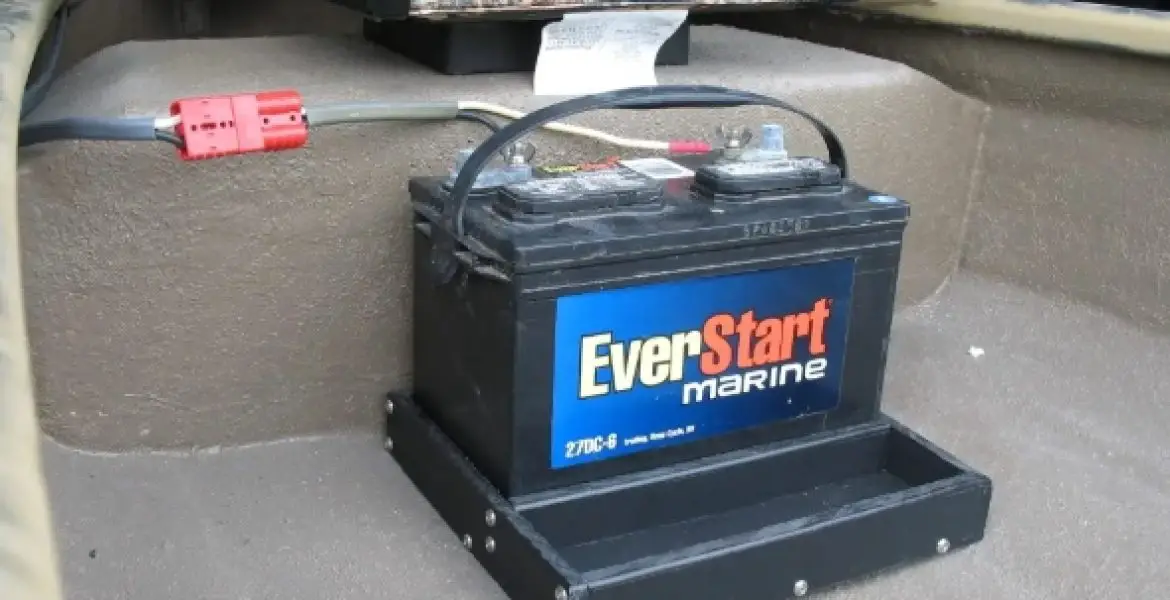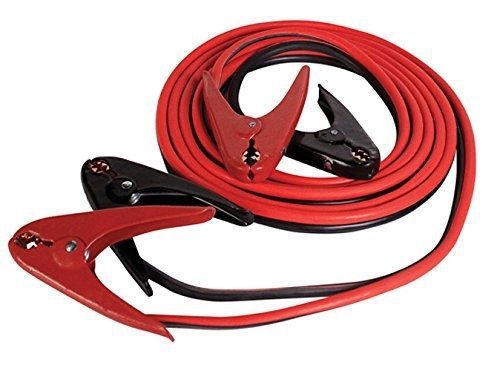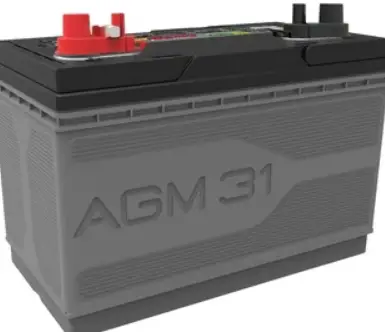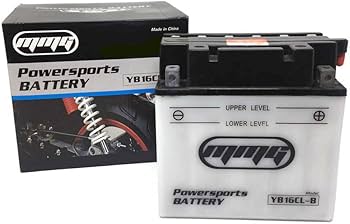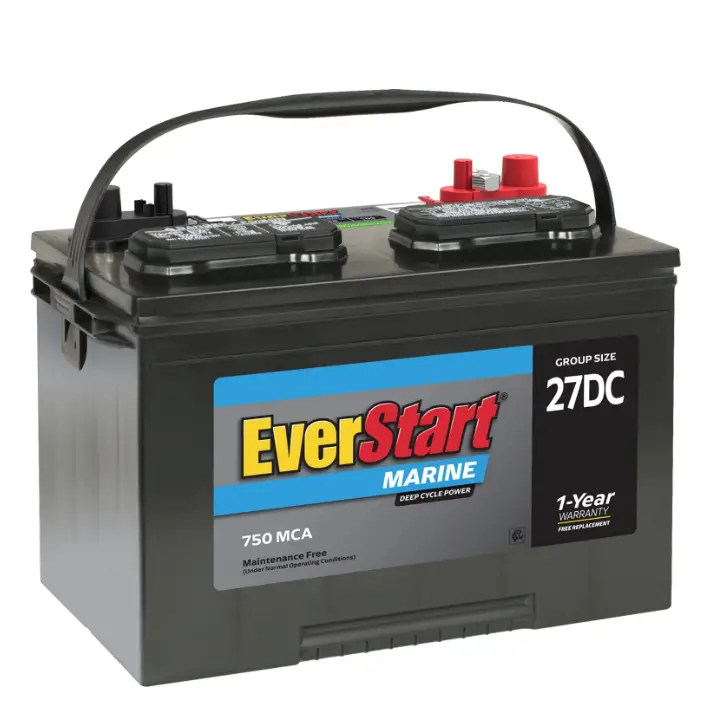
EverStart Lead Acid Marine & RV Deep Cycle Battery, Group Size 27DC 12 Volt, 750 MCA
- 750 MCA
- Dual post
- Free battery testing and installation at your local Walmart Auto Care Center. If you need to get rid of your old battery, there is free battery recycling at your local Walmart Price shown does not include the Core Battery charge (varies by state). Automotive battery purchases placed on dotcom will have core fee refunded with a gift card once battery cores are returned to stores.
- Selection and ratings can vary by store.
$93.76
As I stared at my trolling motor struggling to maintain power during what was supposed to be a relaxing fishing trip last summer, I knew it was time for a change. That disappointing day on the water led me down a rabbit hole of research into marine batteries, eventually bringing me to the Everstart 27DC. After months of personal experience and countless conversations with fellow boaters and RV enthusiasts, I’m sharing everything I’ve learned about this versatile power solution.
The Beginning of My Battery Journey
The early morning fog was still lifting off the lake when my trolling motor sputtered and died. There I sat, drifting aimlessly, watching other anglers happily working their favorite spots while I fumbled with my phone to call for a tow. That day cost me more than just a fishing trip—it was a wake-up call that I needed to understand marine batteries better.
Like many weekend warriors, I had simply grabbed whatever battery was available when I first set up my boat, paying little attention to specifications or maintenance needs. That mistake wouldn’t happen again.
What Exactly Is the Everstart 27DC Battery?
The Everstart 27DC is what battery experts call a “dual-purpose” battery, designed to provide both starting power and deep cycle capabilities. This hybrid design makes it incredibly versatile for various applications.
The Everstart 27DC battery serves as both a starting battery and a deep cycle battery, which means it can deliver the high-current burst needed to start engines while also providing sustained power for accessories and electronics. This dual functionality is what initially drew me to consider it for my 17-foot fishing boat.
Manufactured by Johnson Controls for Walmart’s Everstart brand, these batteries have become popular among recreational boaters, RV owners, and off-grid enthusiasts for their balance of performance and affordability.
Deep Cycle Capabilities: The Real Story
One question that comes up frequently in forums and marine supply stores is whether the Everstart 27DC is truly a deep cycle battery. The answer requires some nuance.
While marketed as a dual-purpose battery, the 27DC leans more toward the deep cycle end of the spectrum. It uses thicker plates than a typical starting battery, allowing it to withstand repeated discharge cycles better than standard automotive batteries.
However, it’s important to understand that the 27DC is not a “true” deep cycle battery like those specifically designed for trolling motors or off-grid solar systems. Those batteries can handle being discharged to much lower levels repeatedly.
In my experience using the 27DC for both starting my outboard and powering my trolling motor, I’ve found it performs admirably in both roles as long as you don’t regularly discharge it below 50% capacity. This makes it perfect for weekend warriors like me who need versatility more than extreme deep cycling capability.
Technical Specifications: Breaking Down the Numbers
When I first started researching marine batteries, the technical jargon was overwhelming. CCA? MCA? Amp-hours? Reserve capacity? It felt like learning a new language. Let me break down the Everstart 27DC’s specifications in plain English.
Amp-Hour Rating: How Long Will It Run?
The Everstart 27DC typically has an amp-hour rating of approximately 80-90 Ah, though this isn’t always clearly stated on the battery itself. This rating essentially tells you how much energy the battery can store.
In practical terms, this means if you’re drawing 1 amp of current, the battery should theoretically provide power for 80-90 hours. Drawing 10 amps? You’ll get 8-9 hours. Of course, real-world performance varies based on temperature, discharge rate, and battery condition.
For my trolling motor, which draws about 25 amps on medium speed, I can expect around 3 hours of continuous use before reaching the 50% discharge mark (the level I try not to go below to preserve battery life).
Cold Cranking Amps: Starting Power When You Need It
The Everstart 27DC boasts approximately 750 Cold Cranking Amps (CCA), which represents the battery’s ability to start an engine in cold temperatures. This specification measures how many amps the battery can deliver at 0°F for 30 seconds while maintaining a voltage of at least 7.2 volts.
For most outboard motors and small to medium-sized engines, this provides more than enough starting power, even on chilly mornings. I’ve started my 90HP outboard in 40°F weather without any hesitation using this battery.
Physical Characteristics: Size and Weight Considerations
Before purchasing the Everstart 27DC, I needed to ensure it would fit in my boat’s battery compartment. The standard dimensions are approximately 12.75 inches long, 6.75 inches wide, and 9.5 inches tall—classified as a Group 27 battery in the industry’s standardized sizing system.
As for weight, the 27DC typically weighs around 50-55 pounds. This substantial heft is due to the lead-acid construction and reinforced internal components. While not the lightest option available, the weight actually helps provide stability in marine applications where rough water might otherwise jostle lighter batteries.
Real-World Applications: What Can You Power?
The versatility of the Everstart 27DC is perhaps its greatest strength. Over the past year, I’ve used mine in several different applications and spoken with others who have found even more creative uses.
Marine Applications: From Trolling Motors to Fish Finders
My primary use for the Everstart 27DC has been in my fishing boat. It serves dual duty by starting my outboard motor and powering my 55-pound thrust trolling motor.
For trolling motor applications, the 27DC performs admirably for moderate use. On a typical 6-hour fishing trip, using the trolling motor intermittently at various speeds, I’ve never run out of power. However, for all-day trolling at higher speeds, you might want to consider a true deep cycle battery or carrying a backup.
Beyond propulsion, the 27DC easily powers fish finders, marine radios, navigation lights, and other onboard electronics with plenty of reserve capacity. I’ve found that even after a full day on the water using all my electronics, the battery still has significant charge remaining.
RV and Camping Uses: Off-Grid Power Solution
Last fall, I loaned my 27DC to a friend for a two-week RV trip through the Southwest. His feedback provided valuable insight into the battery’s performance in recreational vehicles.
In his Class C motorhome, the 27DC powered interior lights, the water pump, and occasional use of the furnace fan when boondocking (camping without hookups). He reported getting about three days of moderate use before needing to recharge, which he did through his RV’s solar panel system.
The dual-purpose nature of the 27DC makes it particularly well-suited for RVs, where it might need to start the generator while also powering interior accessories. My friend was impressed enough that he purchased his own after returning the borrowed one.
Emergency Backup Power: When the Lights Go Out
Though not its primary intended use, I’ve also employed my 27DC as an emergency power source during a prolonged power outage last winter. Using a 1000-watt inverter, I was able to power essential household items like LED lights, charge phones, and even run a small TV for news updates.
This application highlighted both the versatility and limitations of the battery. While it handled small appliances well, the inverter efficiency losses meant the battery drained faster than in direct DC applications like the boat. Still, in an emergency, having this capability proved invaluable.
Battery Lifespan: What to Expect
One of the most common questions I hear about the Everstart 27DC is how long it will last. The answer depends on several factors, including usage patterns, charging practices, and storage conditions.
Typical Lifespan Expectations
Under normal conditions with proper maintenance, you can expect an Everstart 27DC battery to last between 3-5 years in marine applications. My previous battery lasted just over 4 years before showing significant capacity reduction.
This lifespan estimate assumes:
- The battery is not regularly discharged below 50%
- Proper charging procedures are followed
- The battery is stored correctly during off-seasons
- The battery is securely mounted to minimize vibration damage
It’s worth noting that how you use the battery significantly impacts its lifespan. If you frequently discharge it deeply (below 50% capacity), you might see a shorter lifespan of 2-3 years. Conversely, if you’re meticulous about maintenance and only use it for light duty, you might get 5+ years of service.
Warranty Coverage: Your Safety Net
The Everstart 27DC typically comes with a 12-month free replacement warranty and a limited warranty that extends beyond that initial period. This warranty coverage is one of the reasons I felt comfortable choosing this battery for my boat.
When I purchased mine at Walmart, the associate explained that if the battery fails within the first year, they would replace it at no cost. After that initial period, a prorated warranty applies for an additional 1-2 years depending on the specific model purchased.
Always keep your receipt and warranty information in a safe place. I learned this the hard way when my previous battery failed, and I couldn’t locate my purchase documentation. That mistake cost me a warranty replacement I should have received.
Charging Best Practices: Maximizing Performance and Lifespan
Proper charging is perhaps the single most important factor in extending the life of your Everstart 27DC battery. Through trial and error (and some unnecessary early replacements), I’ve developed a charging regimen that seems to work well.
Choosing the Right Charger
For the Everstart 27DC, I recommend using a smart charger specifically designed for deep cycle or marine batteries. These chargers adjust their output based on the battery’s state of charge, preventing the damaging overcharging that can occur with standard automotive chargers.
I personally use a 10-amp marine battery charger with float mode capability. This allows me to charge the battery relatively quickly when needed, but also maintain the battery during long storage periods without overcharging it.
The Charging Process: Timing and Methods
A fully discharged Everstart 27DC will typically take 8-10 hours to reach full charge using a standard 10-amp charger. I’ve found that charging after each use, regardless of how little I used the battery, helps extend its overall lifespan.
The charging process typically follows three stages:
- Bulk charging (constant current) – The initial phase where the charger delivers maximum current
- Absorption charging (constant voltage) – As the battery nears full charge, current gradually decreases
- Float/maintenance charging – Once fully charged, the charger switches to a low voltage to maintain charge without overcharging
For weekend boaters like me, I connect the charger the evening before I plan to use the boat, ensuring a full charge by morning. After returning from the water, I clean any corrosion from the terminals and reconnect the charger to restore the battery to 100%.
Solar Charging Compatibility
One question that frequently comes up is whether the Everstart 27DC can be charged using solar panels. The answer is a definitive yes, with some caveats.
The 27DC works well with solar charging systems that include a proper charge controller. The charge controller is crucial as it prevents overcharging and battery damage that could occur from direct solar panel connection.
My RV friend uses a 100-watt solar panel with a 10-amp charge controller to maintain his 27DC while boondocking. He reports that on sunny days, this setup fully recharges the battery in about 10-12 hours of good sunlight after moderate overnight use.
Maintenance Tips: Keeping Your Battery Healthy
While marketed as “maintenance-free,” the Everstart 27DC still benefits from some regular attention to ensure optimal performance and longevity.
Is It Truly Maintenance-Free?
The Everstart 27DC is sealed and does not require water additions like older flooded lead-acid batteries. In this sense, it is “maintenance-free.” However, this doesn’t mean you can install it and forget about it completely.
Regular maintenance should still include:
- Checking and cleaning terminals to prevent corrosion
- Inspecting the case for cracks or bulging
- Testing voltage periodically to monitor health
- Ensuring proper mounting to minimize vibration
I’ve made it a habit to perform these checks monthly during the boating season and before and after winter storage.
Terminal Maintenance: The Silent Battery Killer
Battery terminal corrosion is one of the most common causes of poor performance and premature failure. The white or bluish powdery substance that sometimes appears on terminals can prevent proper electrical connection and even cause damaging resistance.
I clean my battery terminals every few months using a mixture of baking soda and water, applied with an old toothbrush. After cleaning and rinsing, I dry the terminals thoroughly and apply a thin coating of dielectric grease or terminal protectant spray.
This simple maintenance routine has dramatically reduced connection problems compared to my previous battery, which I admittedly neglected.
Storage Practices: The Off-Season Challenge
Proper storage during the off-season is critical for battery longevity, especially in colder climates. I learned this lesson the expensive way after improperly storing my first marine battery and finding it dead the following spring.
For winter storage of the Everstart 27DC, I now follow these steps:
- Fully charge the battery before storage
- Disconnect it from all electrical systems
- Store it in a cool, dry place (around 40-60°F is ideal)
- Connect a quality float charger or perform monthly maintenance charging
- Clean the terminals before reinstallation in spring
Following this routine has eliminated the springtime disappointment of discovering a dead battery when I’m eager to get back on the water.
How to Test Your Battery: DIY Health Checks
Understanding how to test your Everstart 27DC can help you identify problems before they leave you stranded. I’ve developed a simple testing routine that requires minimal tools but provides valuable insights into battery condition.
Voltage Testing: The Basic Health Indicator
The simplest way to check your battery’s health is with a digital multimeter. Here’s my testing procedure:
- With the battery at rest (unused for at least 6 hours), measure the voltage across the terminals
- A healthy 27DC should read between 12.6-12.8 volts when fully charged
- Readings below 12.4V indicate a partial state of charge
- Readings below 12.0V suggest the battery needs immediate charging
- If the battery won’t hold above 12.4V after charging, it may be nearing the end of its useful life
I perform this test monthly during the boating season and before and after winter storage.
Load Testing: Beyond Voltage Readings
While voltage testing provides basic information, a load test offers deeper insight into the battery’s actual performance capability. Many auto parts stores will perform this test for free, but you can also purchase a battery load tester for home use.
A load test temporarily draws a significant current from the battery while monitoring voltage. A healthy Everstart 27DC should maintain at least 9.6 volts under a load equal to half its CCA rating for 15 seconds.
I have my battery professionally load tested each spring before the boating season begins. This practice has helped me avoid mid-season failures by identifying weakening batteries before they leave me stranded.
Comparing the Everstart 27DC to Alternatives
The marine and RV battery market offers numerous alternatives to the Everstart 27DC. Understanding how it compares to other options can help you determine if it’s the right choice for your specific needs.
Budget Considerations: Value Proposition
With a typical price point between $100-130, the Everstart 27DC positions itself as a mid-range option in the marine/RV battery market. This represents a good value considering its dual-purpose capabilities.
Premium marine batteries from brands like Optima, Odyssey, or VMAX can cost $250-400 for similar capacity. While these premium options often offer longer lifespans and better deep cycle performance, the price difference is substantial.
In my experience, the Everstart 27DC delivers about 70-80% of the performance of premium brands at roughly half the cost. For weekend recreational users, this value proposition often makes more sense than investing in top-tier batteries.
Technology Alternatives: AGM and Lithium Options
The Everstart 27DC uses traditional lead-acid technology with enhanced plate design. Alternative technologies include:
- AGM (Absorbed Glass Mat) batteries: Offer better vibration resistance, deeper discharge capability, and maintenance-free operation, but at a higher cost
- Lithium Iron Phosphate (LiFePO4) batteries: Provide much lighter weight, faster charging, deeper discharge capability, and longer lifespan, but at 3-5 times the cost
After researching these alternatives, I determined that for my weekend fishing trips, the traditional technology of the Everstart 27DC offered the best balance of performance and value. However, if I were living aboard a boat or RV full-time, I might consider the premium alternatives despite their higher initial investment.
Brand Comparisons: How Does Everstart Stack Up?
Comparing the Everstart 27DC to similar dual-purpose batteries from other manufacturers reveals its competitive position:
- Interstate: Similar performance with slightly higher price and more widely available service
- Duracell Marine: Comparable performance and price with potentially better warranty support
- Bass Pro Shops XPS: Similar specifications with premium pricing but excellent in-store support
Having tried both the Everstart and Interstate options in similar applications, I found the performance differences minimal for recreational use. The Everstart’s lower price point and convenient availability at Walmart locations nationwide ultimately influenced my decision.
Where to Buy: Finding the Best Deal
The Everstart 27DC is primarily sold through Walmart stores and their online platform, which offers both advantages and limitations.
Retail Availability
Walmart’s extensive network of stores means the Everstart 27DC is widely available across the United States. This accessibility proved valuable when I needed an emergency replacement while traveling out of state for a fishing tournament.
Most Walmart stores carry these batteries in their automotive department. In my experience, larger stores in areas with significant boating activity tend to maintain better inventory, especially during peak boating season.
Pricing Strategies
I’ve noticed that Everstart battery pricing remains relatively stable throughout the year, with occasional sales during early spring and late fall. The typical price range is $100-130 depending on location and ongoing promotions.
One advantage of purchasing from Walmart is their price matching policy. When I found a similar dual-purpose battery on sale at another retailer, Walmart matched the price, saving me about $15 while still getting the convenient warranty support of buying direct.
Warranty Processing Experience
Having gone through the warranty process once, I can attest that Walmart makes battery replacement relatively straightforward. When my previous battery failed within the warranty period, I simply brought it to the automotive department along with my receipt.
After a quick test confirmed the failure, they processed the warranty exchange with minimal paperwork. The entire process took less than 30 minutes, which was much more convenient than dealing with mail-in warranty claims from online retailers.
Environmental Considerations: Responsible Ownership
As responsible boaters and outdoor enthusiasts, we must consider the environmental impact of our battery choices and disposal practices.
Recycling Your Old Battery
Lead-acid batteries like the Everstart 27DC are among the most successfully recycled products in the world, with recovery rates exceeding 99% in many areas. When my previous battery reached the end of its useful life, I returned it to Walmart during the purchase of my replacement.
Most retailers, including Walmart, Auto Zone, and battery specialty shops, accept old batteries for recycling. Many states mandate a deposit system where you pay a core charge (typically $5-15) when purchasing a new battery, which is refunded when you return the old one.
Never dispose of lead-acid batteries in regular trash or abandon them in nature, as they contain hazardous materials that can cause significant environmental damage.
Environmental Impact Considerations
While lead-acid batteries like the Everstart 27DC have excellent recycling infrastructure, they do have environmental considerations:
- Manufacturing process is energy-intensive
- Lead mining and processing has environmental impacts
- Battery acid can cause environmental damage if improperly handled
These factors influenced my maintenance practices, as proper care extends the battery’s life and reduces the frequency of replacement and recycling. I’ve found that my environmentally-conscious approach to battery maintenance aligns perfectly with maximizing performance and value.
My Personal Verdict: Is the Everstart 27DC Right for You?
After more than a year of using the Everstart 27DC in my fishing boat and lending it for various other applications, I’ve developed a nuanced view of its strengths and limitations.
Who Should Consider the Everstart 27DC?
In my experience, the Everstart 27DC is best suited for:
- Weekend recreational boaters who need both starting and accessory power
- RV owners who camp occasionally with modest power needs
- Budget-conscious users who value affordability over premium features
- Users with convenient access to Walmart for warranty service if needed
- Those new to boating or RVing who want a versatile, forgiving battery
The dual-purpose design makes it particularly valuable for users who want to simplify their power setup with a single battery rather than separate starting and deep cycle units.
Who Might Want to Look Elsewhere?
Based on my experience and conversations with other users, the Everstart 27DC might not be ideal for:
- Full-time boaters or RVers with heavy daily power demands
- Users who frequently discharge batteries deeply (below 50%)
- Competitive anglers who run trolling motors at high speeds for extended periods
- Those seeking the absolute longest lifespan regardless of initial cost
- Users in extremely hot climates, where battery life may be shortened
For these users, investing in a true deep cycle battery or premium AGM/lithium technology might provide better long-term value despite higher initial costs.
Conclusion: Power You Can Count On
That fateful day when my old battery left me stranded on the lake ultimately led me to a better understanding of marine power systems and to the Everstart 27DC. Through seasons of use in various conditions, this versatile battery has proven itself a reliable companion for my outdoor adventures.
While not perfect for every application, the Everstart 27DC battery represents an excellent balance of performance, versatility, and value for recreational marine and RV use. Its dual-purpose design eliminates the need for separate starting and deep cycle batteries in many applications, simplifying power management while delivering reliable performance.
As I prepare for another season on the water, I’m confident in my power choice. With proper maintenance and realistic expectations, the Everstart 27DC continues to power my adventures without breaking the bank.
Whether you’re trolling for bass, powering your RV’s essentials while boondocking, or simply seeking reliable power for weekend recreation, the Everstart 27DC deserves serious consideration. Just remember that, like any battery, how you use and maintain it will ultimately determine how well it serves you.
Happy boating, camping, and adventuring with power you can count on!

